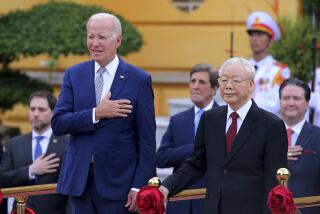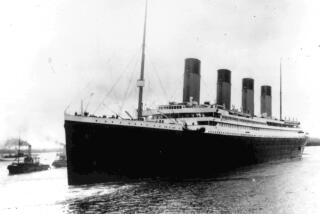Hanoi Allows Visit to Crash Site; Links Search to Ties
HANOI â Although a U.S. team was allowed last week to visit the site where a B-52 bomber crashed in 1972, Vietnam said Saturday that it will not let American experts excavate such sites in search of airmen missing in action during the Vietnam War until Washington agrees to establish diplomatic relations with Hanoi.
That statement to visiting Western newsmen by Foreign Minister Nguyen Co Thach appeared to be the most explicit so far by Hanoi making normalization of relations a prerequisite for letting the United States search for remains of its missing war dead.
On Friday, a visiting five-man U.S. military team from the Hawaii-based Joint Casualty Resolution Center was taken briefly to Gia Lam, a town 25 miles northeast of Hanoi where a B-52 bomber crashed in December, 1972, during an American bombing raid on what was then known as North Vietnam.
The group, which makes periodic visits to Hanoi for technical discussions on missing U.S. servicemen, got permission to return to the same site in June. However, the Americans were told they would not be allowed to dig for the buried wreckage and remains of flyers.
Thach told Western reporters that permission for the U.S. teamâs visits and preliminary survey in Gia Lam is not inconsistent with his statement that a search for flyersâ remains would be barred until formal U.S.-Vietnamese ties are arranged. The visits, he said, are âa special caseâ designed âto whet their (American) appetites.â
âWe have no diplomatic relations with the United States,â he said in English. âHow can we accept a hostile government to come here and investigate our country?
âAs the MIA wounds of war are in the United States, so the wounds of war in Vietnam are still alive. We can help to heal the wounds of war in the United States, but the United States has the responsibility to heal the wounds of war in Vietnam. Why the one-way traffic?â
Vietnam has from time to time turned over remains of missing U.S. servicemen to American representatives. However, Thachâs statement could help reinforce suspicions expressed by some of the families of the MIAs that Hanoi is withholding the remains of dead servicemen--and might even hold prisoners--to be used some day as bargaining chips. The Vietnamese have repeatedly denied such allegations.
2,400 Are Missing
More than 2,400 American servicemen are still missing in the Indochina war, more than half of them in Vietnam, the rest in Laos, Cambodia or over water off the coast of Vietnam. Most U.S. military officials presume them to be dead.
Lingering doubts and the failure to recover and repatriate more of the remains have soured the already strained relations between Washington and Hanoi.
Vietnamese officials have insisted they are doing all they reasonably can to locate and return any remains, and have chafed at sporadic criticism from Washington on the issue.
On at least one occasion, Hanoi suspended a meeting of U.S. and Vietnamese technical experts to discuss the location of remains because of official remarks in Washington that the Vietnamese interpreted as questioning their sincerity in finding MIAs.
In Laos, American experts were allowed in February to excavate a crash site, the first such operation in the nearly 10 years since the war ended. They came away with pieces of wreckage and bones, which are being tested for identification.
Western diplomats based in Hanoi say that the Communist authorities here are eager to improve relations with the United States to reduce their destitute nationâs economic dependence on the Soviet Union.
Several years ago, Washington was on the verge of establishing diplomatic ties with Hanoi, but broke off the talks to protest Vietnamâs invasion and occupation of neighboring Cambodia in late 1978. The Carter Administration then was also in the process of establishing diplomatic relations with Peking, and did not want to jeopardize normalization with China by recognizing its adversary in Hanoi.
U.S. Sets Terms
Since then, aid from Western countries to Vietnam has virtually dried up and trade links have been drastically reduced. The United States and most of its allies have set withdrawal of Vietnamese troops from Cambodia as a precondition for improving ties with Vietnam, but Hanoi has been unwilling to make such a move.
Thach said that Vietnam had allowed a team of experts from Australia, which has diplomatic relations with Hanoi, to investigate a crash site where Australians were believed killed during the war.
And he noted that Laos, which recently allowed an American team in, has diplomatic relations with the United States.
The Vietnamese foreign minister said that while Hanoi would like to normalize ties with the United States, Vietnamâs survival does not depend on it.
âWe have survived 4,000 years without relations with the U.S.,â he said. âIâm sure we can survive some years more.â
Ties with Washington would end the U.S. trade embargo against Vietnam and make it eligible to receive loans and aid from U.S. allies.
More to Read
Sign up for Essential California
The most important California stories and recommendations in your inbox every morning.
You may occasionally receive promotional content from the Los Angeles Times.










